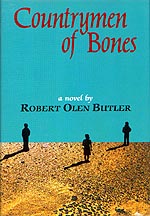Introduction to Our First Catalog of Vietnam War Literature
 The man we called Sparky lived down a dusty path in the
village of Honai. He was our contact who somehow always
seemed to find out when the VC were going to rocket the
nearby air base at Bien Hoa. The other American intelligence
agent and I, fooling no one about our military identities
with our PX chinos and hush puppies, would come to Sparky's
house and the information he gave us always seemed an
incidental matter for him. His wife had the table covered
with food, more food than I'm sure they could afford to give
someone outside their family. But Sparky would say, "Come.
Sit and eat with me," and he would sit us down and he would
talk about his home in the North, how he and the other men
of this village had carried the bell from their Catholic
church eighteen hundred kilometers to this place.
The man we called Sparky lived down a dusty path in the
village of Honai. He was our contact who somehow always
seemed to find out when the VC were going to rocket the
nearby air base at Bien Hoa. The other American intelligence
agent and I, fooling no one about our military identities
with our PX chinos and hush puppies, would come to Sparky's
house and the information he gave us always seemed an
incidental matter for him. His wife had the table covered
with food, more food than I'm sure they could afford to give
someone outside their family. But Sparky would say, "Come.
Sit and eat with me," and he would sit us down and he would
talk about his home in the North, how he and the other men
of this village had carried the bell from their Catholic
church eighteen hundred kilometers to this place.
And at Tet we ate stuffed goose and stewed chicken and sauteed beef and cauliflower with liver and the dishes which could only be called by the rich little monosyllables of their Vietnamese names, the cha gio and the thit ham and the vit tiem, and we ate mangosteens with ice in thin glasses and we smoked Sparky's water pipe until we were soaked with sweat and Sparky was weeping with friendship. "You are the nicest Americans I have ever met," he said, because we spoke to him in his own language and we bowed to his wife whose teeth were red from chewing betel nuts. And when our unit stood down and we were about to leave, he said, "We have spoken many words together. Do not forget. Please remember me and my family."
 The books that are represented in this catalog make the same
request of us. Some are written in tears, like Sparky's,
full of regret and loss. Some are written in outrage, some
in despair, some in guilt, some even in a kind of nostalgia.
But they all say: "We have tried to make sense of this
welter of experience by words. Many words have been spoken
and we must not forget." And as a novelist I would further
say that it is fine to examine Vietnam with our minds, but
more importantly we must not forget the way life happened in
Vietnam moment-to-moment, in the sense-based, unabstracted
experience of individual sensibilities. And when works of
art ask us to enter these sensibilities, don't forget that
this war involved Americans only secondarily. We had our
one-year tours into Vietnam and our own souls, but we came
back to a place that was our own. Even those Americans who
continue to struggle with their experiences have a country
and a culture and representative government to rail against.
The Vietnamese had no home away from the war, and now
800,000 of them live among us with a sense of loss that we
can only vaguely imagine. Read about Vietnam and all that we
Americans suffered and learned, but also remember the
Vietnamese.
The books that are represented in this catalog make the same
request of us. Some are written in tears, like Sparky's,
full of regret and loss. Some are written in outrage, some
in despair, some in guilt, some even in a kind of nostalgia.
But they all say: "We have tried to make sense of this
welter of experience by words. Many words have been spoken
and we must not forget." And as a novelist I would further
say that it is fine to examine Vietnam with our minds, but
more importantly we must not forget the way life happened in
Vietnam moment-to-moment, in the sense-based, unabstracted
experience of individual sensibilities. And when works of
art ask us to enter these sensibilities, don't forget that
this war involved Americans only secondarily. We had our
one-year tours into Vietnam and our own souls, but we came
back to a place that was our own. Even those Americans who
continue to struggle with their experiences have a country
and a culture and representative government to rail against.
The Vietnamese had no home away from the war, and now
800,000 of them live among us with a sense of loss that we
can only vaguely imagine. Read about Vietnam and all that we
Americans suffered and learned, but also remember the
Vietnamese.
Robert Olen Butler
Lake Charles, Lousiana
January 18, 1990
Copyright © 1990 by Robert Olen Butler